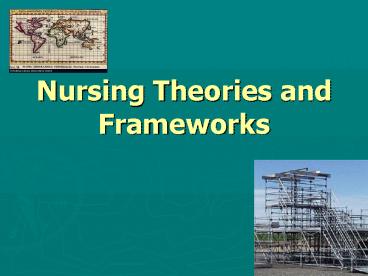Nursing Theories and Frameworks PowerPoint PPT Presentation
1 / 25
Title: Nursing Theories and Frameworks
1
Nursing Theories and Frameworks
2
Learning Objectives
- Compare inductive and deductive reasoning
- Differentiate between conceptual and theoretical
frameworks - Describe how a framework guides research
- Differentiate between conceptual and operational
definitions - Describe the relationship between research and
theory and practice
3
Learning Objectives
- Differentiate between grand and midrange nursing
theories - Describe the criteria for critique of theoretical
or conceptual frameworks in the nursing literature
4
Approaches to Science
- Inductive Reasoning
- Deductive Reasoning
5
Ladder of Abstraction
- Worldview
- Frameworks
- Theories
- Concepts
- Variables
6
Concept
- Definition
- an abstraction
- creates an image of an idea we want to share
- representations of particular aspects of human
behavior and characteristics - Pain
- Coping
- Grief
- Resilience
7
Identify the Concepts
- A theoretical model was developed and tested to
explain the effects of learned helplessness,
self-esteem, and depression on the health
practices of homeless women. (Flynn, 1997) - prevalence and consequences of verbal abuse of
staff nurses by physicians were examined in the
context of Lazarus stress-coping model.
(Manderino Berkey, 1997)
8
Construct
- Similar to a concept in that it refers to an
abstraction - Different from a concept in that it is
deliberately invented (constructed) by
researchers for a scientific purpose - Health locus of control
- Self-care in Orems model
- Concept and construct are sometimes used
interchangeably although a construct often refers
to a more complex abstraction than a concept
9
Terminology
- Conceptual framework
- Structure of concepts and theories pulled
together like a map for the study
- Theoretical framework
- A structure of concepts that exists in the
literature, a ready-made map for the study - Provide a theoretical rationale for the
development of hypotheses
10
Conceptual Framework
- Explains how the variables in your study are
expected to relate to each other - A conceptual framework is used when the
literature does not contain a specific theory
that explains the relationship between study
variables.
11
Theoretical Framework
- Used when the variables have been studied before
and have been found to be related to one another - At Level I there may be no framework based on
existing literature. This establishes a rationale
for the need to conduct such a study. - At Level II you can provide a conceptual
framework from literature on the variables of
your study. - Level III studies always have theoretical
frameworks.
12
What does a framework do?
- Provides direction for the study by providing an
organized set of ideas/variables and their
relationships - Reveals conceptual and operational definitions
- Guides what data is to be collected and analyzed
13
Terminology
- Conceptual definition like a dictionary
definition conveys the general meaning of a
concept - Operational definition specifies how the
concept will be measured (i.e., what instruments
will be used)
14
Appendix B Van Cleve et al., 2004
15
Terminology
- Theory set of interrelated concepts that
provides a systematic view of a phenomenon - OR Theory is an abstract generalization that
presents a systematic explanation about the
relationships among phenomena - Theory guides practice and research practice
enables testing of theory and generates questions
for research research contributes to
theory-building and establishing practice
guidelines. LB-W H p. 113
16
Nursing Theory
- Many theory/concepts Borrowed from other
disciplines - Nursing Theories
- Grand
- Mid-range
- Microrange
17
Nursing Theories
- Conceptual structure that organizes practice and
research into ideas central to the discipline - Nursing theories are reservoirs in which
findings related to nursing concepts, such as
comfort, healing, recovering, mobility, rest,
caring, enabling, fatigue, and family care, are
stored. Meleis (1997)
18
Grand Theories
- Conceptual structures that include views on
person, health, and environment to create a
perspective of nursing - Historically important
- Guides discipline of nursing today
- Abstract level
- Address a phenomena of concern to nursing from a
different perspective
19
Grand Theories
- Imogene King, 1981 Open Systems Model
- Madeleine Leininger, 1991 Theory of culture
care diversity and universality - Dorothea Orem, 1985 Self-care Model
- Sr. Callista Roy, 1984, 1991 Adaptation Model
- Jean Watson, 1999 Theory of Caring
- These models are broad, formal explanations of
what nursing discipline is according to the
developers point of view
20
Midrange Theories
- Are moderately abstract but composed of concepts
that are measurable - More focused than grand theories
- Have a stronger relationship with research and
practice - Lie between everyday working hypotheses and
grand theoriesMerton (1968)
21
Midrange Theories
- Tend to focus on concepts of interest to nurses
- Pain, empathy, grief, self esteem, hope, comfort,
dignity, quality of life - Some midrange theories have their basis in grand
theories - Midrange theory of self-care deficit grew out of
Orems (1980) grand theory of self care
22
Midrange Theories
- Categorized by level of abstraction
- High, middle and low
- K. Kolcaba Theory of Comfort
- R. Mercer Maternal Role Attainment
- AACN The Synergy Model for Patient Care
23
Microrange Theory
- Closely related to midrange theories
- More narrow in scope
- Described at the level of hypothesis
- Questions/ hypotheses derived from practice
24
Critique Criteria
- Is the theoretical or conceptual framework
clearly identified? - Is the framework consistent with a nursing
perspective? - Is the framework appropriate to guide research on
the topic? - Is there logical connection between the
framework, concepts and the measurement?
25
Critique Criteria
- Are the concepts clearly and operationally
defined? - Was sufficient literature reviewed to support the
proposed relationships? - Is there a logical link between the framework,
the study concepts, and the methods of
measurement?

